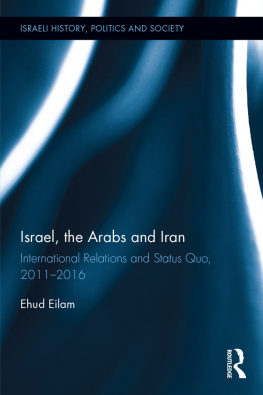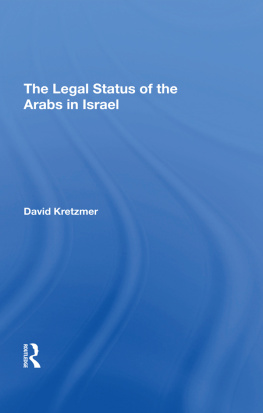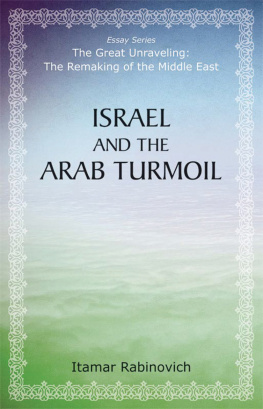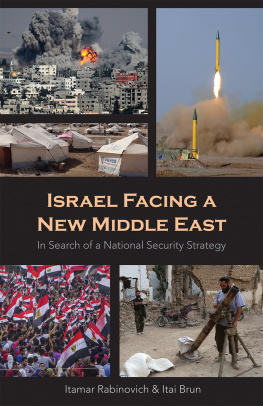Israel, the Arabs and Iran
Israel borders four states Syria, Egypt, Jordan and Lebanon and two entities the Palestinian Authority in the West Bank and Hamas in the Gaza strip. In recent years, despite incidents on the border with Syria and Egypt, the basic strategic status quo with these countries has not changed, and the overall balance of power between Israel and the Arabs has been maintained. Due to its military might, none of Israels Arab neighbours are able to defeat it. Israel, however, for political, economic and military reasons, avoids enforcing its will and interfering in internal Arab matters and has successfully managed to stay out of the Arab turmoil.
Israel, the Arabs and Iran gives a detailed overview of the various national security challenges that Israel has faced since 2011. It explains the key considerations and constraints Israel has had to deal with on several fronts, from its northern border with Lebanon to its southern border with Egypt. The book provides the reader with a deep understanding of why and how Israel has struggled to keep the status quo, whilst a large part of the Middle East remains in turmoil.
The book is aimed at anyone studying Israel, its Foreign Policy, Middle Eastern Politics and International Relations. It will also appeal to government officials, military officers and anyone working or interested in national security issues concerning the Middle East and particularly Israel.
Dr. Ehud Eilam has been dealing with and studying Israels national security for more than 25 years. He served in the Israeli military and later on he worked as a private contractor for the Israeli Ministry of Defense. He is now a writer and an independent researcher.
Israeli History, Politics and Society
Series Editor: Efraim Karsh
Kings College London
For a full list of titles in the series:
www.routledge.com/middleeaststudies/series/SE0790
This series provides a multidisciplinary examination of all aspects of Israeli history, politics and society and serves as a means of communication between the various communities interested in Israel: academics, policy-makers; practitioners, journalists and the informed public.
58Ralph Bunche and the Arab-Israeli Conflict
Mediation and the UN, 19471949
Elad Ben-Dror
59Muslim/Arab Mediation and Conflict Resolution
Understanding Sulha
Doron Pely
60Antisemitism and Anti-Zionism in Turkey
From Ottoman Rule to AKP
Efrat Aviv
61The Jewish Origins of Israeli Foreign Policy
A Study in Tradition and Survival
Shmuel Sandler
62Israel, the Arabs and Iran
International Relations and Status Quo, 20112016
Ehud Eilam
Israel: The First Hundred Years (Mini Series)
edited by Efraim Karsh
- 1Israels Transition from Community to State, edited by Efraim Karsh
- 2From War to Peace?, edited by Efraim Karsh
- 3Politics and Society since 1948, edited by Efraim Karsh
- 4Israel in the International Arena, edited by Efraim Karsh
- 5Israel in the Next Century, edited by Efraim Karsh.
Israel, the Arabs and Iran
International Relations and Status Quo, 20112016
Ehud Eilam

First published 2018
by Routledge
2 Park Square, Milton Park, Abingdon, Oxon OX14 4RN
and by Routledge
711 Third Avenue, New York, NY 10017
Routledge is an imprint of the Taylor & Francis Group, an informa business
Ehud Eilam 2018
The right of Ehud Eilam to be identified as author of this work has been asserted by him in accordance with sections 77 and 78 of the Copyright, Designs and Patents Act 1988.
All rights reserved. No part of this book may be reprinted or reproduced or utilised in any form or by any electronic, mechanical, or other means, now known or hereafter invented, including photocopying and recording, or in any information storage or retrieval system, without permission in writing from the publishers.
Trademark notice: Product or corporate names may be trademarks or registered trademarks, and are used only for identification and explanation without intent to infringe.
British Library Cataloguing-in-Publication Data
A catalogue record for this book is available from the British Library
Library of Congress Cataloging-in-Publication Data
Names: Eilam, Ehud, author.
Title: Israel, the Arabs and Iran : international relations and status quo,
20112016 / Ehud Eilam.
Other titles: Cass seriesIsraeli history, politics, and society ; 62.
Description: Abingdon, Oxon ; New York, NY : Routledge, 2018. | Series:
Israeli history, politics and society ; 62 | Includes bibliographical
references and index.
Identifiers: LCCN 2017016795 | ISBN 9781138093652 (hbk) | ISBN
9781315106700 (ebk)
Subjects: LCSH: IsraelHistory21st century. | IsraelPolitics and
government1993 | IsraelForeign relationsArab countries. |
Arab-Israeli conflict.
Classification: LCC DS128.2 .E35 2018 | DDC 327.5694017/4927dc23
LC record available at https://lccn.loc.gov/2017016795
ISBN: 978-1-138-09365-2 (hbk)
ISBN: 978-1-315-10670-0 (ebk)
Typeset in Times New Roman
by Apex CoVantage, LLC
Contents
Israel borders four states Syria, Egypt, Jordan and Lebanon. Apart from those states there are two more entities bordering with Israel, the PA (Palestinian Authority) in the West Bank, and Hamas in the Gaza Strip. In recent years, the overall and basic balance of power between Israel and the Arabs has been maintained with no fundamental change. Israel and Arabs, on each of Israels borders, were aware of their constraints. Neither of Israels Arab neighbors, not even a coalition of them, is able to defeat Israel due to its military might. Israel, however, for political, economic and military reasons, avoids enforcing its will by interfering in internal Arab matters, such as causing regime change. Nevertheless, there were cracks in the already fragile status quo between Israel and Arabs, manifested in tension, crises and even clashes. This book examines those factors, along with relevant events and their implications.
The biggest challenge to the status quo between Israel and Hamas was the confrontation in JulyAugust 2014, when Israel could have seized the entire Gaza Strip and toppled the Hamas. Israel rejected that option due to the various ramifications of such a move. Instead, as in previous rounds, Israel sought to strike the Hamas up to the point that the latter agreed to a cease fire. The problem with this concept was the political, military and economic distress of the Hamas, which fed its uncooperative mood, forcing it to come out with some achievement or continue the fight.
Hamas was unable to inflict a major blow to Israel after firing more than 4,500 rockets and mortar shells at Israeli targets. Hamas did not stop Israels air strikes and land offensive either. The Hamas did manage to cause the Israel defense forces (IDF) dozens of casualties, such as by firing and laying down improvised explosive devices (IEDs). The Hamas also managed to maintain its command and control during the entire fight.
The Arab turmoil that started in 2011 created shock waves all over the Middle East. It started hundreds of kilometers away from Israel, in places like Tunisia, Libya and Yemen, countries not involved much or almost at all in the ArabIsraeli conflict. Yet the Arab storm made its way closer to Israel, Egypt and Syria. The latter exploded into a civil war, from which Israel has been striving to stay out, except for a few sorties aiming to block the delivery of advanced weapons to the Hezbollah. There were also some skirmishes on the border between Israel and Syria in the Golan Heights. In spite of all that, the status quo between Israel and Syria remained more or less as it has been since 1982, the date of the last war between those two countries. Neither side attempted breaking the stalemate through escalation or alternately restarting the peace talks that ended in 2008.













